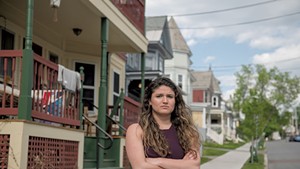
- Matt Mignanelli
The SUV came ripping down the Burlington bike path, snapping overhanging branches as cyclists screamed and swerved to avoid getting hit. Laurie Keve, who was biking home to Colchester that August afternoon, said the sight of the silver car and its driver barreling past her near Leddy Park was "one of the most frightening experiences of my life."
But when Keve called 911 to report it, the Burlington dispatcher who took the call seemed merely annoyed. There was nothing the police could do, Keve said the dispatcher told her brusquely, because the department had been "defunded."
"She was just so dismissive and disrespectful," Keve said. "I'm just imagining all these horrific things that are happening while this dispatcher is arguing with me."
When residents call the police, they expect to talk to an empathetic professional who wants to help. Yet Keve isn't the first caller to tell Seven Days she was met instead with complaints about department "defunding." Similar concerns have reached members of the citizen police commission, the police chief and city hall, raising questions about the extent to which the city's dispatch center has been using crime victims to press political points.
The reports come as the department's staffing levels have dropped low enough that police sometimes can't respond for hours to lower-priority calls. At the same time, department critics say they fit a pattern of troubling behavior across the agency, from leaders fearmongering about crime rates to officers pointing fingers at Chittenden County State's Attorney Sarah George during her recent primary race. It threatens to strain public trust in local police, according to American Civil Liberties Union of Vermont executive director James Lyall.
"What's most concerning about this is what it says about the culture," Lyall said, "and how much a culture of misinformation and misleading rhetoric is filtering down through all levels of the department."
Acting Police Chief Jon Murad did not make himself available for an interview for this story. He did, however, use Seven Days' inquiry about Keve's experience as the basis to launch an "internal review" of the incident, which then served as the department's justification for declining to provide information about it. Murad later responded to written questions, stating that the department had not received any formal citizen complaints about employees mentioning "defunding" when interacting with crime victims. However, he's heard concerns informally about dispatchers' demeanors and employees "discussing resources and their availability," including via Mayor Miro Weinberger.
"I have addressed these concerns on a case-by-case basis for the past two years," he wrote.
On August 23, the same day Seven Days contacted the acting chief about the issue, Murad said he emailed employees instructions on how to discuss staffing shortages with callers. He provided the text of the message. "When we can't send someone, the public deserves an explanation why," Murad wrote.
"Our low staffing is a fact, and it may be relevant to why a response will or won't be forthcoming," Murad continued. "The history of that staffing deficit, however—including the term 'defund' or the idea of 'defunding'—is not relevant. It will not be used as an explanation or excuse."
Keve's account of her August 19 conversation with a Burlington dispatcher echoed one that Robyn Schenck said she had in March. Schenck awoke one morning to find that her brand-new Honda CR-V was missing from her South End driveway; she had the thief on camera.
Hours after her first call to the department's nonemergency line, Schenck was still waiting for an officer to arrive, so she called back. The person who took her call, Schenck said, told her something along the lines of: "That's what happens when you defund the police."
Schenck, who said she supports the police and is sympathetic to their staffing woes, nevertheless said the comment added "insult to injury."
"I was distressed, and my car had been stolen," she said. "It was not an appropriate response to me at the time."
In Vermont, 911 tapes are not released publicly. Seven Days has a request pending for Schenck's calls to Burlington's nonemergency line. The Burlington Police Commission, a citizen oversight panel, can review the calls if someone files a written complaint. Though cochair Stephanie Seguino said she's heard of similar accounts secondhand, no one has lodged a formal grievance, limiting what the panel can do.
"The commission takes this very seriously," she said. "Our goal is both to promote high-quality public safety in the community and to build trust between community members and the police department."
Department data show that people have lodged five so-called "courtesy" complaints against dispatchers in the past two years, since nationwide protests over the May 2020 murder of George Floyd prompted Progressives on the Burlington City Council to cut the number of police officers by 30 percent through attrition. Two of the complaints were sustained, the records show, while the dispatchers were "exonerated" in the other three.
To Lyall of the ACLU of Vermont, department employees' gripes about "defunding" aren't just unprofessional; they're inaccurate. Last fall, following a consultant's recommendations, city councilors restored the authorized number of Burlington officers to 87, just five fewer than the department had on staff in June 2020. The department also has funds to employ 18 new, unarmed positions intended to help divert officers away from mental health and other calls.
The department had just 61 sworn officers as of August 1, the result of faster-than-expected attrition and hiring struggles that are affecting policing agencies across Vermont and nationwide.
The most recent department budget included raises and signing bonuses for officers, plus $1 million for a so-called "rebuilding" plan. Murad spent an hour last week on WVMT's "Morning Drive" radio show, telling listeners that the department's most recent budget was "terrific" and "one of the only budgets in the city that did not get smaller."
Nonetheless, the 2020 staffing cut, since reversed, continues to color pro-police narratives about public safety in Burlington. Two weeks before Murad's appearance on "Morning Drive," Gov. Phil Scott emphasized on the same program that "with all due respect to Burlington, they defunded the police. They did that."
"We haven't defunded the police," the governor said of the stretched-thin Vermont State Police. "We are just struggling with [a] workforce shortage that we face statewide in all sectors."
Burlington's dispatch center faces a staffing shortage similar to the one among sworn officers, but it has been less publicized. Five of the 12 dispatch positions at 1 North Avenue are vacant, according to Murad, as is the manager of the team and that manager's manager.
The struggles with Burlington dispatch are compounded by a plan to create a regional center for six Chittenden County cities and towns. Currently, calls to 911 are routed to state-run answering centers, whose responders then transfer the caller to the appropriate locally run dispatch office. The regional plan would create a new, combined 911 and dispatch center managed by a regional board.
The project received initial endorsements before the pandemic delayed the rollout, said South Burlington Fire Chief Steven Locke, who chairs the board of the new Chittenden County Public Safety Authority. Locke said its members are hoping to launch regional dispatch in late 2023, pending final approval from participating municipalities.
The looming transition has fueled an exodus from Burlington's dispatch center, said Ron Jacobs, a representative for the local AFSCME union that represents dispatchers and many other city employees.
Earlier this year, the city and AFSCME struck a deal to boost dispatchers' hourly pay, currently advertised at $24, as long as the center remains short-staffed.
"People are leaving because there's so much job insecurity and uncertainty," Jacobs said.
Their jobs have become harder, too. Dispatchers are on the front line of implementing Murad's "priority response plan," tasked with explaining to callers why an officer isn't immediately available. So far this year, 2,455 calls — 16 percent of the total volume — have had a delayed response due to the staffing shortage, according to Murad.
Regardless, Lyall said, professionalism is especially important as the department strives to "rebuild" its ranks.
"Is that the department we want to be bringing new officers into?" he asked.
As for Keve's crime report, it's not clear whether police ever followed up. There's no entry in the department's daily blotter matching the one Keve said she made. Murad said that's also part of the ongoing internal review.
"'Betrayed' is the only word I can think of," Keve said of how her experience with dispatch made her feel. She wondered: "Does this woman think this is a hoax? Does she not believe me?"














Comments
Comments are closed.
From 2014-2020, Seven Days allowed readers to comment on all stories posted on our website. While we've appreciated the suggestions and insights, right now Seven Days is prioritizing our core mission — producing high-quality, responsible local journalism — over moderating online debates between readers.
To criticize, correct or praise our reporting, please send us a letter to the editor or send us a tip. We’ll check it out and report the results.
Online comments may return when we have better tech tools for managing them. Thanks for reading.